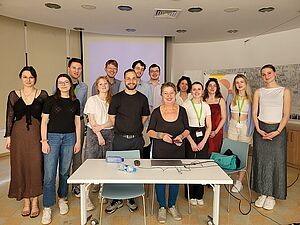Journalism students explore Cyprus on a research trip
In mid-April, 14 journalism students travelled to Cyprus to explore the impact of the Cyprus conflict and geopolitical crises on the country 20 years after its accession to the EU. During the excursion organised by the Chair of International Journalism, they researched their own journalistic articles, which will be published in various media in the coming weeks.
Over the course of eight days (13 to 20 April), 14 students from the Institute of Journalism had the opportunity to get to know Cyprus and to study it under the main topic "Dream of Europe? The Divided Island and the Consequences of European Politics" to observe the effects of internal and international conflicts on the Mediterranean island. The group was accompanied by EBI staff members Dominik Speck and Richard Brandt. A two-day preparatory seminar led by Monika Lengauer served to prepare for the trip and to analyse the complex historical and political background on Cyprus.
20 years after the eastward enlargement of the EU and Cyprus' accession in May 2004, the focus was also on the question of the extent to which the international community was able to fulfil its promise to help bring peace to the conflict between Turkish and Greek Cypriots. Although the entire island is de jure part of the European Union, EU law does not de facto apply in the internationally unrecognised Turkish Republic of Northern Cyprus.
In the divided capital Nicosia, the programme included meetings with NGOs, experts and media representatives on both sides of the inner-Cypriot border, and the group also explored traces of social movements in both parts of the city on a guided tour. Discussions with the German Embassy in Nicosia and the local branch of the Friedrich-Ebert-Stiftung provided valuable background information.
A UN peacekeeping mission has been stationed in Cyprus for exactly 60 years. The UN Special Representative in Cyprus, Colin Stewart, received the Dortmund students for talks at the UN headquarters in the UN-controlled buffer zone that divides the island. The former Nicosia airport, which has been abandoned since 1974, is also located there and symbolises the deadlocked conflict on the island. Three British blue helmets guided the group through the ghost airport.
Consequences of European migration policy in Cyprus
Another focus of the trip was on the topic of migration and forced displacement. The students were able to impressively explore the consequences of European migration policy in Cyprus. The visit to the Pournara refugee camp was particularly memorable, where the students gained an insight into the living conditions and concerns of the residents.
Cyprus recorded the highest number of asylum applications per capita of all EU countries in 2023, and in recent months the number of refugees and migrants arriving in Cyprus by boat from Lebanon, mainly from Syria, has continued to rise. During the study trip, Cyprus President Nikos Christodoulidis announced that the country would suspend the processing of asylum applications from Syrians until further notice. This controversial announcement was discussed during the visit to the Pournara camp, as well as in talks with the UN refugee agency UNHCR and the NGO Cyprus Refugee Council.
In Nicosia, the programme also included a joint workshop with journalism students from the University of Cyprus, which covered topics such as career prospects in the media market in both countries, as well as division and reunification from a German and Cypriot perspective. The study trip was organised in collaboration with lecturer Venetia Papa from the University of Cyprus and the two communication scientists Dimitra Milioni and Lia T. Spyridou from the Cyprus University of Technology in Limassol.
At the end of the trip, the delegation from Dortmund explored the port city of Limassol on Cyprus' south coast, a centre of the financial and IT industry as well as the Russian, Ukrainian and Israeli communities in the country. The programme there included a visit to the editorial office of the online medium "Limassol Today", a discussion with the business blogger Panis Pieri and a meeting with activists of Russian origin who are organising protests in Cyprus against Vladimir Putin's policies.
The trip was funded by PROMOS
For their journalistic contributions, the participants researched topics such as the situation of international students in Northern Cyprus, the role of trade unions in the Cyprus conflict, everyday life in the divided capital and the disadvantages experienced by children from marriages between Turkish Cypriots and Turkish citizens. The students independently organised interviews with discussion partners beyond the joint appointments, and were thus able to gain valuable insights into reporting from abroad.
The study trip under the overall direction of Prof. Dr Susanne Fengler was financially supported by PROMOS, the programme of the German Academic Exchange Service (DAAD) to increase student mobility. In previous years, the EBI has organized PROMOS-funded excursions to Romania, Bosnia-Herzegovina, Croatia and Jordan.

